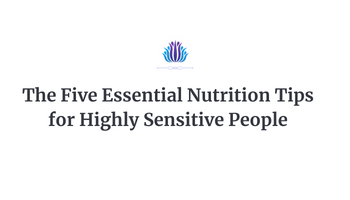It’s no secret that highly sensitive people tend to be more aware of their internal, emotional landscape. They have rich, elaborate and creative inner lives.
It should come as no surprise, then, that highly sensitive people also tend to have a more nuanced relationship with their bodies. They are keyed into subtlety and notice when something is “off.”
The upside to that is that its easier for an HSP to correct moment to moment in ways that are supportive for health. If we notice that we are falling sick with a cold, for example, we might catch it at the beginning, rest up and beat it out before it has time to take root.
Another upside is that we are intimately acquainted with our hunger and satiety signals. We notice when hunger starts. Most HSP could tell you exactly when they start to have an inkling toward hunger (and exactly when they are starting to get full).
There is a downside, however.
Have you ever seen a highly sensitive person hungry? It’s not pretty.
HSP tend to be a lot like hummingbirds. They eat small, frequent meals. The only problem is that like our hummingbird brethren…while we only need small amounts of nectar in each meal…if we don’t get it, we die. Well…not literally. But you’d certainly think we were on the brink of death based on how poorly we behave.
Anyway…I’ll get to the point. Highly sensitive people, perhaps more than most others, REALLY need to pay attention to their eating habits. The way I like to say it is this: we have a short karmic leash. If we don’t eat clean, we will feel it more intensely. It will have a greater impact on our ability to function. And that, by extension, will have a negative impact on all other aspects of our lives (our work, our relationships, etc.)
So here are five things all HSP should pay attention to when it comes to their food choices.
- Highly sensitive people (on the whole) tend to do better when they eat small, frequent meals. An example of how this might look is as follows:
- Meal 1: 250 – 425 calories
- Snack 1: 150 – 300 calories
- Meal 2: 250 – 400 calories
- Snack 2: 150 – 275 calories
- Meal 3: 250 – 375 calories
- Snack 3: 150 – 250 calories
- Within each meal and snack, there should always be two things present. You want food that has some fiber in it, and you want something that has some protein in it.
- Each snack should have at least 6 grams of protein (a piece of string cheese, a hard boiled egg, a serving of beans, a serving of almonds, a half serving of chicken) AND 3 grams of fiber (a serving of fruit or a serving of a non-starchy vegetable)
- Each meal should include at least 15 grams of protein (a serving of meat, soy, non-fat greek yogurt) and at least 6 grams of fiber (two servings of vegetables or a serving of a vegetable and a serving of a fruit).
- Eat bigger portions at the start of the day and smaller portions by the end of the day. The metabolism is at its peak at the start of the day (and we need the bulk of our energy at the beginning for getting through all of our obligations). And by the end of the evening, reducing the quantity of food we eat also helps us get to sleep more easily.
- Stay really well hydrated. A good rule of thumb is to take your weight (in pounds) and divide that number by two. That number is the amount of ounces you should try and drink each day. Then, on highly active days, try to add 20 more ounces to that number. Why is this important? We can often mistake thirst for hunger. Staying well hydrated helps avoid the tendency to mindlessly snack when we are, in fact, thirsty. That is MUCH easier on the digestive tract (not to mention our waistlines). It also helps with energy. It’s a known fact that highly sensitive people tend to be sensitive to the effects of caffeine and alcohol. Dehydration can lead to a sense of fatigue. Stay hydrated, you’ll need less coffee…which will also help with sleep.
- Throw out the junk. This is obvious for just about everyone. But highly sensitive people, in particular, don’t do well with junk food. My experience with my clients has shown me that most HSP can become more easily addicted to processed foods and are more likely to fall prey to using them as comfort foods when overly stimulated. It’s a nasty cycle. But how can we discern junk food from the real thing? Read your labels. Apply these five principles:
- There should be at least 3 grams of fiber AND/OR 6 grams of protein for every 100 calories
- There should be no sugar in the first 3 ingredients. (Be careful…the food industry uses over 60 names for sugar. Here is a resource that might be helpful to you.
- Look at the ingredients. If you cannot pronounce and identify all of them…maybe its best not to eat it.
- There should be no hydrogenated oils in the ingredients. This is a trans fat. There is no such thing as a healthy amount of trans fats.
- Five ingredients or less is best.
To be clear…I’m not suggesting that this approach is only good for highly sensitive people. This kind of approach would be good for anyone to follow. It’s just that highly sensitive people tend to be especially responsive to adjustments in the diet (this can be a very good thing. But if the body is ignored, it can be a bit of a disaster).
Eating in this way helps to balance your blood sugar. When your blood sugar is balanced, your three primary hormones (insulin, adrenaline, and cortisol) are better managed. When your hormones are managed, you’re more capable of coping with stimuli and stress. And when you’re more capable of coping…you’re a much more fun human being to hang around. (Trust me…every romantic partner I have ever had knows NEVER to let me leave the house without a snack in my purse. Hungry Leah is a bit like an angry Hulk. You don’t wanna see me hungry).
You’ll be amazed at how quickly these small adjustments to your habits will improve multiple spheres of your life.
I’d love to hear from you. What does your nutrition plan look like? How does what you eat impact your capacity?

